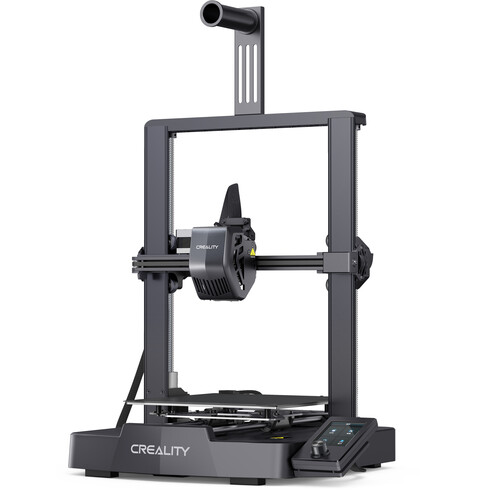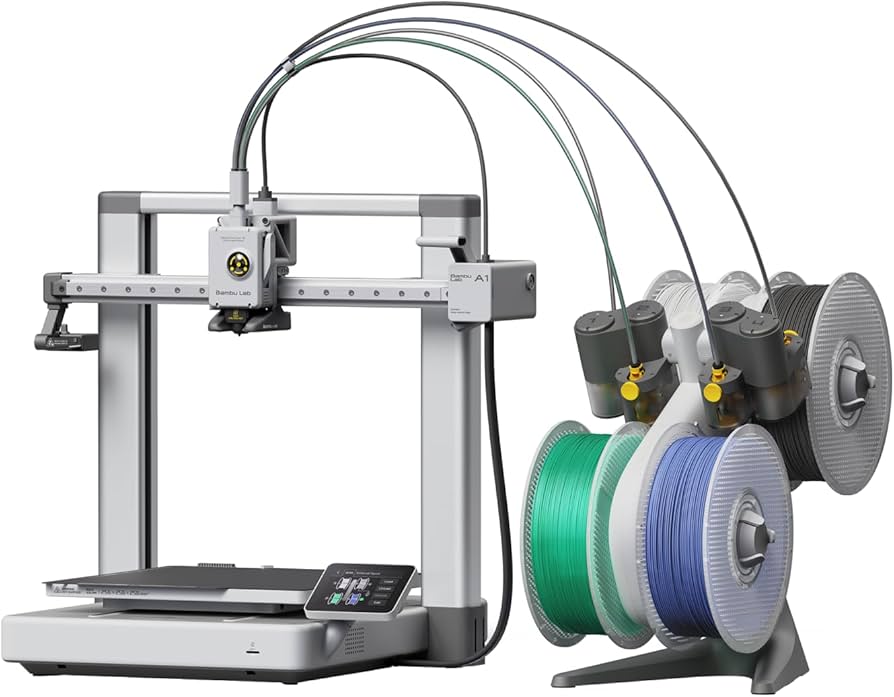Compare Ender 3 V3 SE vs A1
Comparison between the best 3D printers
Choose the best 3D printer at the best price. The cheapest 3D printers are here.
Buy a 3D printer here with 3D Fila.
 |
 |
|
| Model | Ender 3 V3 SE[BUY Ender 3 V3 SE] |
A1[BUY A1] |
| Printing Material | Filament | Filament |
| Buy Filament for Creality Ender 3 V3 SE | Buy Filament forBambu Lab A1 | |
| Estimated price | $199,00 | $700,00 |
| Manufacturer | Creality | Bambu Lab |
| Release Year | 2023 | 2023 |
| Print Volume [mm] | 220x220x250 | 256x256x256 |
| Printer Size [mm] | 420x366x490 | 385x410x430 |
| Weight [kg] | 7,34 | 8,3 |
| Power Loss Recovery | NO | YES |
| Enclosed printer | NO | NO |
| Bed Leveling | Automatic | Automatic |
| Filament End Sensor | NO | YES |
| Bed type | Heated | Heated |
| Power supply system | Direct Drive | Direct Drive |
| Standard nozzle | 0,4 | 0,4 |
| Maximum Nozzle Temperature [°C] | 260 | 300 |
| Maximum Bed Temperature [°C] | 100 | 100 |
| Maximum printing speed [mm/s] | 250 | 500 |
| Filament holder | YES | YES |
| Camera for supervision | NO | NO |
| Recommended filaments | PLA, PETG e TPU (95A+) | PLA, PETG, TPU, PVA |
| Recommended slicers | Creality Print, Cura 5.0 ou superior, Prusa Slicer, Orca | SuperSlicer, PrusaSlicer, Cura, OrcaSlicer |
| Maximum Resolution [mm] | 0,1 | 0,1 |
| Processor | 32-bit Silenciosa | |
| Display | 3,2'' + Knob | Touchscreen 3,5 |
| Power Supply | 350 W | 350 W |
| Connectivity | SD | Wi-Fi, Bambu-Bus, Cartão Micro SD |
| Operating systems | Windows, Linux, Macbook | Windows, Linux, Macbook |
| Date of registration in the system | 2024-03-06 | 2024-07-17 |
| Release date | 2023 | 2023 |
| Extra features | The Ender 3 V3 SE stands out for its easy assembly, excellent automatic bed leveling, direct extrusion and easy interface, ideal for beginners. Although it uses a coated PC board, it offers robust performance, with print speeds of up to 250mm/s, thanks to a solid construction and linear rods on the Y axis. It lacks Wi-Fi, preferring file transfer via SD card. | The BambuLab A1 printer features fully automatic calibration, multi-color printing with the AMS system, active flow rate compensation, quick nozzle change with a clip, active motor noise cancellation, a build volume of 256x256x256 mm³, a maximum extruder temperature of 300°C, and a heated bed of up to 100°C. In addition, it has high precision, a machine health management system and an intuitive 3.5-inch touchscreen interface. |
| Support for multiple colors and materials (AMS and CFS) | NO | YES |
Notes * |
||
| Cost-benefit | 7 / 10 | 7 / 10 |
| Hardware | 0.7 / 10 | 4.2 / 10 |
| Tela | . | . |
| Print volume | 3 / 10 | 4 / 10 |
| Performance | 2 / 10 | 4 / 10 |
| [BUY Ender 3 V3 SE] | [BUY A1] |
Conclusion |
| In conclusion, the comparison between the Ender 3 V3 SE and the Bambu Lab A1 highlights significant differences catering to diverse user needs and budgets. The Ender 3 V3 SE, with its lower price point, is an excellent choice for beginners or hobbyists seeking a reliable and straightforward 3D printing experience. It offers essential features like automatic bed leveling and decent print speeds, making it user-friendly while still delivering solid performance for various materials. On the other hand, the Bambu Lab A1, although more expensive, brings advanced capabilities that appeal to more experienced users or professionals. It boasts superior print quality, faster printing speeds, and enhanced features such as automatic calibration and support for multiple colors and materials. The touchscreen interface and robust health management system further enhance its usability. Ultimately, the choice between these two printers hinges on the user's budget and printing requirements. For those looking for an affordable and efficient entry point into 3D printing, the Ender 3 V3 SE stands out. Conversely, for users with a higher budget desiring advanced features and greater versatility, the Bambu Lab A1 provides a compelling option. |

